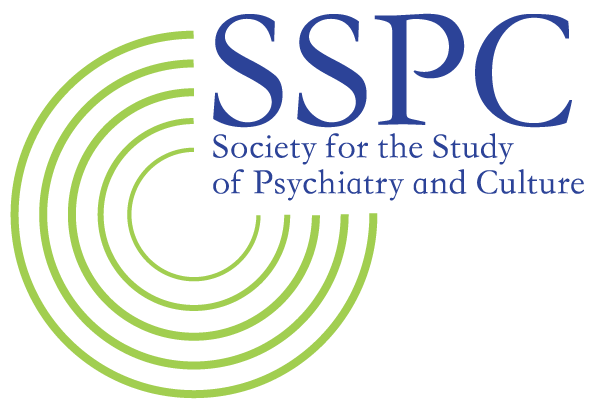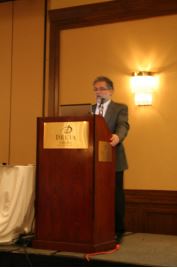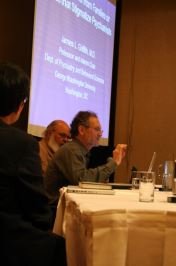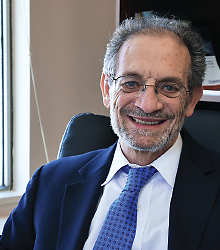by Larry Merkel
SSPC was invited by APA President Dilip Jeste to sponsor a symposium at the 2013 American Psychiatric Meeting in San Francisco. The first presentation was Renato
Alarcón’s on “Culture and Cultural Components in Medical Students and Psychiatric Residency Training”, in which he reviewed critical issues in global psychiatry that necessitate a cultural perspective within psychiatry, such as the global realities of an increase in psychiatric conditions, the need to foster psychiatric vocations, and the need for a “polyvalent psychiatrist.” Furthermore, the importance of psychiatrists being skilled in psychotherapy, the need for consolidation and balance between humanism and advances in neuro-scientific knowledge, and the need for international cooperation and coordination between mental health providers, also entail an appreciation of the role of culture in psychiatric training. He also reviewed the ACGME core competencies in psychiatric training and how they mandate an understanding of culture in various aspects of psychiatric training. Dr. Alarcón delineated the importance of cultural psychiatry to the Milestones Project promoted by the ACGME and the ABPN. Reviewing the emphasis on Knowledge, Attitude, and Skills training within medical schools and psychiatric residencies, he outlined specific goals within both medical student and psychiatry resident training for each of these domains and reviewed the various didactic tools that can be utilized to accomplish these goals. He emphasized the appropriate utilization of different kinds of settings, including psychotherapy activities (specifically in “cultural psychotherapy” settings) and individual demonstrations by different clinical team members, including interpreters. In addition he outlined complementary/reinforcing activities, such as journal clubs, movie-based discussions, experiential groups, historiographic “therapy” activities, and psycho-cinema and psychodrama activities that can further enhance cultural psychiatry training.
The next speaker was Karen Mu (PGY III University of California at San Francisco) on “Cross-Cultural Training: A Resident’s Perspective.” Karen began by outlining the factors that both encouraged and discouraged an interest in cultural psychiatry among psychiatry residents. She then reviewed the history of cultural psychiatry teaching at UCSF. The psychiatry department at UCSF is in the process of reviewing and revising their training in cultural psychiatry and is utilizing Kern’s approach to curriculum development, which she outlined. She then described programs at NYU and UC Davis and how these provide models for program development. Reviewing feedback from UCSF residents, Karen made 8 points to be considered in developing a cultural psychiatry program (see box, left). Based on this feedback, she then introduced the program at UCSF, including specific goals and didactic methods. A key element of the UCSF program is the Cultural Workshop. She then described work toward a cultural track program.
The third speaker was Larry Wilson, MD who spoke on “The Value of Global Health Experiences in Psychiatry Training and Practice.” The increased ease and comfort of global travel has opened access to direct experience in cultural diversity within a psychiatric setting for many. He outlined the various forms and types of overseas psychiatric experience. These included short-term and longer term varieties of clinical experiences, ranging from brief consultations as a member of a team or solo to sabbaticals. He outlined the process by which these are available to residents and practicing psychiatrists. He also emphasized the importance of cultural sensitivity and the use of cultural brokers. He then described his own experiences consulting in South Asia, Southeast Asia, and the Pacific. He talked sbout the benefits that come from such experiences and stressed that while such experiences can be a fascinating and enriching personal and professional adventure, it is very important to guard against “Psychiatric Tourism.” When done with the proper attitude, this work can help a psychiatrist become more culturally aware and effective as a healer, while sensitizing the psychiatrist to cultural and ethnic influences on both ill and healthy persons back home.
The next speaker, Roberto Lewis-Fernández, presented “Use of the Cultural Formulation to Train Psychiatry Residents.” Roberto emphasized that teaching cultural psychiatry requires the right combination of didactic and experiential methods. He then commented on the fact that in the US there is no standard for teaching cultural psychiatry, reviewing the factors that impact upon this effort and results in variation between programs. In contrast, he reviewed the Canadian Psychiatric Association Guidelines and the model program at McGill University. He then summarized data gathered by the GAP Committee on Cultural Psychiatry on the diversity of approaches and teaching experiences at 20 US psychiatry programs. He described the Cultural Formulation course attended by PGY II residents at Columbia University’s psychiatry program and possible adjustments. Reviewing the DSM-5 Cultural Formulation Interview, he discussed the lessons learned at Columbia. He concluded that the CFI provides a deployable skill set founded in theoretical concepts, but there is a need to strike a balance between theory and experiential learning across the continuum of training.
Finally, Jim Griffith talked about “The Doctor-Patient Relationship: Navigating Ethnocultural Differences with Patients and Families During Psychiatric Treatment.” He described cultural conflicts within psychiatric treatment with emphasis on clinical situations involving patients who hate or fear psychiatry. He argues that doctor patient conflicts in the setting of ethnocultural differences are fundamentally different from the transference/countertransference conflicts seen in psychodynamic psychotherapy. He outlined two strategies for countering ethnocultural transference and gave useful “rules of thumb” for managing ethnocultural countertransference, as well as common errors made when working with ethnoculturally different families. As a theoretical framework for this discussion, he described evolutionarily-based neurophysiological systems of identity and relatedness. He then detailed a difficult case involving such a conflict and engaged the audience in examining alternative responses.



